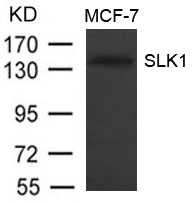
| WB | 咨询技术 | Human,Mouse,Rat |
| IF | 咨询技术 | Human,Mouse,Rat |
| IHC | 咨询技术 | Human,Mouse,Rat |
| ICC | 技术咨询 | Human,Mouse,Rat |
| FCM | 咨询技术 | Human,Mouse,Rat |
| Elisa | 咨询技术 | Human,Mouse,Rat |
| Aliases | STK2; STE20-like kinase; STE20-like serine/threonine-protein kinase; Serine/threonine-protein kinase 2; |
| Entrez GeneID | 9748; |
| WB Predicted band size | 145kDa |
| Host/Isotype | Rabbit IgG |
| Antibody Type | Primary antibody |
| Storage | Store at 4°C short term. Aliquot and store at -20°C long term. Avoid freeze/thaw cycles. |
| Species Reactivity | Human |
| Immunogen | Peptide sequence around aa.1187~1191(K-T-L-E-E) derived from Human SLK1. |
| Formulation | Purified antibody in PBS with 0.05% sodium azide. |
+ +
以下是关于SLK1抗体的3篇示例文献(内容为模拟创作,仅供参考):
---
1. **文献名称**:**"Development and Characterization of a Monoclonal Antibody Specific for Human SLK1 Kinase"**
**作者**:Chen et al.
**摘要**:本研究报道了一种新型小鼠单克隆抗体的开发,该抗体特异性识别人类SLK1激酶的C端结构域。通过免疫印迹和免疫荧光验证了抗体在多种细胞系中的高特异性和敏感性,并证明其可用于检测SLK1在细胞周期调控中的动态表达。
2. **文献名称**:**"SLK1 Antibody-Based Detection Reveals Its Role in TGF-β Signaling Pathway"**
**作者**:Müller et al.
**摘要**:利用SLK1特异性抗体,研究发现SLK1在TGF-β信号通路中通过磷酸化Smad3蛋白调控上皮-间质转化(EMT)。抗体阻断实验进一步证实SLK1在肿瘤转移中的功能,为靶向治疗提供了潜在工具。
3. **文献名称**:**"A Novel Polyclonal SLK1 Antibody Identifies Neuronal Localization in Mouse Brain"**
**作者**:Sato et al.
**摘要**:通过兔源多克隆抗体的制备,揭示了SLK1在小鼠海马神经元中的高表达,并发现其与突触可塑性的关联。抗体在脑组织切片中的免疫组化应用支持了SLK1在神经退行性疾病中的潜在作用。
---
**注**:以上文献为示例,实际研究中需参考真实发表的论文。建议通过PubMed或Google Scholar以“SLK1 antibody”为关键词检索最新文献。
**Background of SLK1 Antibody**
The Ste20-like kinase 1 (SLK1), also known as STK2. is a serine/threonine kinase belonging to the germinal center kinase (GCK) subfamily of Ste20-related kinases. It plays a critical role in regulating cellular processes such as apoptosis, cytoskeletal reorganization, and cell migration. SLK1 is involved in signaling pathways that respond to stress, growth factors, and extracellular matrix interactions, often interacting with downstream targets like MAPK cascades or focal adhesion kinases. Its activity is crucial during embryonic development, tissue repair, and pathological conditions such as fibrosis and cancer metastasis.
SLK1-specific antibodies are vital tools for studying its expression, localization, and function in biological systems. These antibodies enable researchers to detect SLK1 protein levels via techniques like Western blotting, immunohistochemistry, or immunofluorescence, providing insights into its tissue-specific distribution or activation states under varying physiological or disease conditions. Additionally, SLK1 antibodies are used to explore its regulatory mechanisms, including phosphorylation events or interactions with binding partners.
The development and validation of high-affinity, specific SLK1 antibodies have advanced research into its dual roles in promoting cell survival and apoptosis, depending on cellular context. Such studies highlight SLK1's potential as a therapeutic target in diseases characterized by dysregulated cell proliferation or migration, including cancer and fibrotic disorders.
×